Staring at your cramped living room, wondering how to make a small living room look bigger? You’re not alone. Millions of homeowners struggle with tight spaces that feel more like prison cells than cozy sanctuaries.

The good news? You don’t need to knock down walls or spend thousands on new furniture. With the right design tricks, you can transform your small living room into a spacious, airy haven that feels twice its actual size.
This comprehensive guide reveals 19 expert-approved techniques that interior designers use to make small living rooms look bigger. From strategic color choices to clever mirror placement, you’ll discover actionable solutions that work immediately.
Ready to unlock your living room’s hidden potential? Let’s dive in.
Why Small Living Rooms Feel Cramped (And How to Fix It)
Before we explore solutions, let’s understand why small spaces feel suffocating. Most cramped living rooms suffer from three main problems:
- Poor light distribution – Dark corners and blocked windows
- Visual clutter – Too many items competing for attention
- Incorrect proportions – Oversized furniture overwhelming the space
The solution isn’t making your room physically bigger. It’s creating the illusion of space through strategic design choices.
Also: Best Living Room Layout for Small Spaces
1. Choosing Light Colors

Want to instantly make a small living room look bigger? Start with your color palette. Light colors reflect more light than dark ones, creating an immediate sense of openness.
Picture This: Imagine walking into two identical rooms. One has charcoal walls, the other cream. Which feels more spacious? The cream room wins every time because light colors bounce light around, making walls seem farther away.
Here’s how to use light colors effectively:
- Paint walls in soft whites, pale grays, or gentle beiges
- Choose furniture in light neutrals like cream or soft taupe
- Add pops of color through throw pillows and accessories, not major pieces
Pro Tip: Don’t go pure white everywhere. Mix warm whites with cool grays to add depth without sacrificing the space-enhancing effect.
Also: Studio Apartment Ideas Layout That Wow: Maximize Your Space
2. Furniture Placement Strategies

Heavy, bulky furniture kills the spacious feeling you’re trying to create. The key is selecting pieces that feel light and airy, even if they’re substantial.
“To achieve a light and spacious feel within a living room, it’s best to incorporate refined furniture pieces in lighter toned natural finishes. When selecting a piece, be mindful to consider the scale and avoid oversized options.” – Louise Bradley, Interior Designer
Furniture features that make a small living room look bigger:
- Exposed legs – Shows floor space underneath
- Glass or acrylic elements – Visually disappears
- Slim profiles – Takes up less visual weight
- Light wood finishes – Reflects more light than dark wood
Pro Tip: Avoid furniture that sits directly on the floor. Sofas, chairs, and tables with visible legs create the illusion of more floor space.
3. Multifunctional Furniture Solutions

Every piece of furniture in a small living room needs to earn its place. Multifunctional pieces serve double duty, reducing clutter while maximizing utility.
Space-saving furniture options:
- Storage ottomans – Seating plus hidden storage
- Nesting tables – Multiple surfaces that stack away
- Sofa beds – Seating that converts to guest sleeping
- Wall-mounted desks – Workspace that folds flat
Picture This: Your coffee table lifts to reveal storage for blankets and magazines. Your ottoman opens to store extra pillows. Suddenly, your living room feels organized and spacious.
Also: 18 Fresh Decorating Ideas To Update Your Fireplace
4. Incorporate Mirrors for Depth

Mirrors are the ultimate secret weapon when you want to make a small living room look bigger. They reflect light and create visual depth, essentially doubling your space optically.
Interior Design Fact: Strategically placed mirrors can reflect up to 95% of available light, making rooms feel significantly brighter and more open.
Strategic mirror placement techniques:
- Opposite windows – Reflects natural light throughout the room
- Behind furniture – Creates the illusion of continued space
- In dark corners – Brightens shadowy areas instantly
Pro Tip: Go big with mirrors. Small mirrors can look cluttered. One large mirror (at least 24 inches) makes more impact than several small ones.
Also: Best Home Decor Ideas On a Budget
5. Embrace Minimalist Decor

Moving on to embracing minimalist decor to make a small living room look bigger. In a small space, less is definitely more. Embracing a minimalist approach to decor helps create a sense of openness and airiness. Opt for sleek, streamlined furniture pieces and keep accessories to a minimum to avoid clutter.
Choose a few statement pieces that add visual interest without overwhelming the space. By keeping things simple and clutter-free, you can make your small living room feel more spacious and inviting. So, if you’re wondering how to make your small living room look bigger, embrace the beauty of minimalist decor for a fresh and airy feel.
Also: The Ultimate Guide to Designing the Perfect Vignette for Your Home
6. Embrace the Power of Decluttering

Visual clutter is the enemy of spacious-feeling rooms. The fewer items competing for attention, the larger your space appears.
“Smart storage solutions are essential for small living rooms. Investing in furniture with hidden storage compartments helps keep clutter at bay and maximizes floor space, making the room feel more spacious.” – Shea McGee, Interior Designer
Decluttering strategies that work:
- Follow the one-in, one-out rule – Add something new, remove something old
- Use closed storage – Hide items behind doors or in drawers
- Display selectively – Show only your favorite pieces
Clear surfaces daily – Keep coffee tables and side tables mostly empty
Trending Post: Step-by-Step Guide to Declutter Your Home
7. Create Focal Points That Draw the Eye
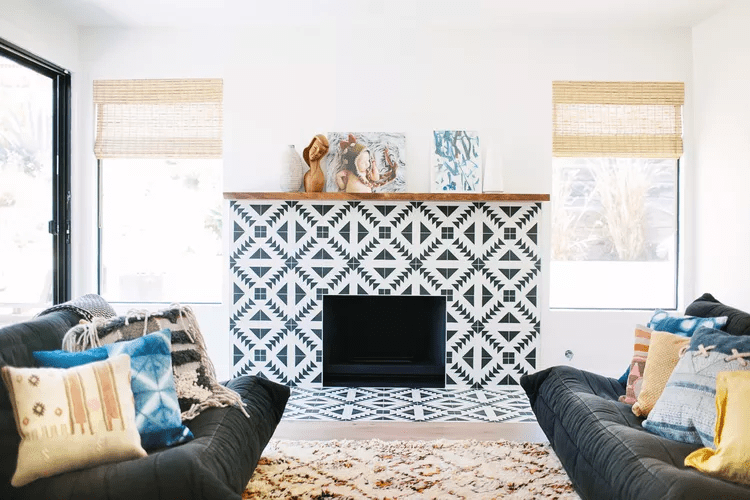
A well-placed focal point distracts from the room’s size limitations while adding visual interest and personality.
Effective focal point options:
- Large artwork – One statement piece instead of gallery walls
- Accent walls – Painted or textured feature walls
- Architectural elements – Fireplace or built-in shelving
- Bold rugs – Anchors the space and adds color
Picture This: You hang one large, colorful painting above your sofa. Instead of noticing the room’s size, guests are drawn to the beautiful artwork, making the space feel intentional and well-designed.
Don’t Miss: How to Create a Soft Color Palette That Transforms Your Entire Home
8. Use Horizontal Lines to Widen Narrow Spaces
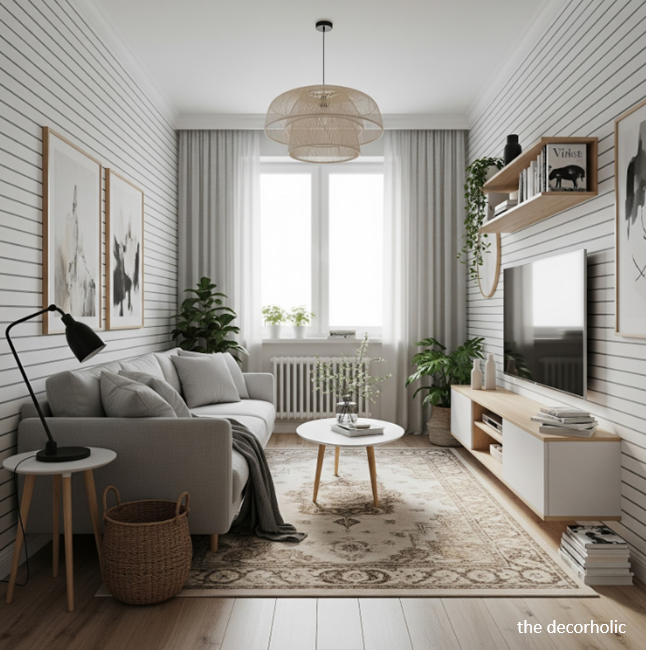
While vertical lines make rooms feel taller, horizontal lines make them feel wider. This is especially useful for long, narrow living rooms.
Horizontal design elements:
- Striped rugs – Horizontal stripes make rooms feel wider
- Long, low furniture – Extends the visual line of the room
- Horizontal artwork – Landscape paintings or wide mirrors
- Floating shelves – Creates horizontal lines on walls
Don’t Miss: How To Layer A Room: Step-by-Step Guide
9. Choose the Right Scale and Proportion

Proportion matters more than size. A few well-chosen, appropriately sized pieces look better than many small items scattered around.
Scale guidelines for small living rooms:
- Furniture should be 2/3 the wall length – For sofas against walls
- Coffee tables should be 1/2 to 2/3 sofa length – Maintains proper proportion
- Rugs should extend under front legs – Unifies the seating area
- Artwork should be 2/3 the furniture width – Creates balanced visual weight
Pro Tip: When in doubt, choose fewer, larger pieces over many small ones. This creates a cleaner, more spacious look.
Trending Post: How To Create a Pinterest Mood Board For Home Decor
10. Utilize Vertical Space
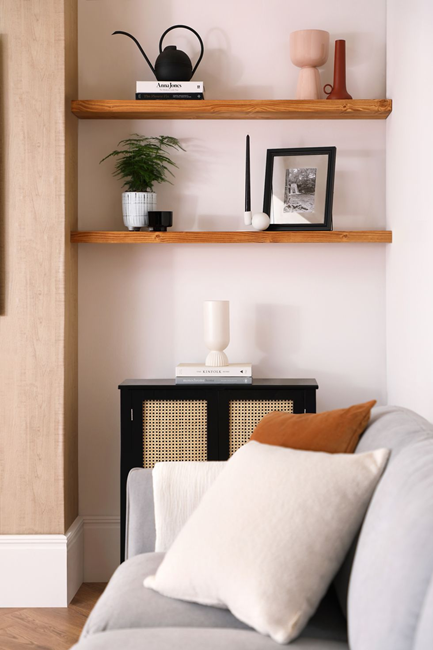
Let’s discuss utilizing vertical space to make a small living room look bigger. When you’re short on floor space, it’s time to look up! Vertical space is often overlooked but can be a game-changer in a small living room. Consider installing shelves or tall bookcases to draw the eye upward and create visual interest.
This not only adds storage but also makes the room feel taller and more expansive. By utilizing vertical space effectively, you can maximize storage and give your small living room a bigger, more spacious feel. So, if you’re wondering how to make your small living room look bigger, don’t forget to look to the walls for extra storage and style opportunities!
Also: Step-by-Step Guide to Declutter Your Home
11. Maximize Natural Light

Natural light is free, abundant, and the best way to make a small living room look bigger. Yet many homeowners accidentally block it with poor window treatments.
Light-maximizing window strategies:
- Hang curtains high and wide – Mount rods near the ceiling, extending past window frames
- Choose sheer fabrics – Filters light while maintaining privacy
- Use light-colored treatments – White or cream curtains reflect light back into the room
- Keep windows unobstructed – Move furniture away from window areas
Picture This: You replace heavy, dark curtains with flowing white sheers hung ceiling-to-floor. Your windows appear larger, and soft light fills every corner.
Also: How To Create Mood Board In Canva: Step By Step Guide

12. Lighting Design for Ambiance

Single overhead lighting creates harsh shadows and makes spaces feel smaller. Layered lighting eliminates dark corners and creates depth.
Essential lighting layers:
- Ambient lighting – General room illumination
- Task lighting – Focused light for specific activities
- Accent lighting – Highlights architectural features
- Natural light – Window light at different times
Pro Tip: Use dimmer switches on all light sources. This allows you to adjust brightness throughout the day, creating the perfect ambiance for any activity.
Also: Table Lamps: Your Guide to Decorating for Function and Flair
13. Choose Small-Scale Furniture

Let’s talk about choosing small-scale furniture to make a small living room look bigger. When it comes to furnishing a small living room, size matters. Opt for furniture with sleek lines and a smaller scale to avoid overpowering the space. Consider pieces like armless sofas or chairs with exposed legs to create a sense of openness.
Additionally, think about multipurpose furniture that can serve multiple functions without taking up too much room. By choosing small-scale furniture, you can maximize space and create a more spacious feel in your small living room.
So, if you’re wondering how to make your small living room look bigger, start by downsizing your furniture for a big impact!
Also: 7 Things Real Estate Agents Hate Spending Money On
14. Create Vertical Visual Interest

When floor space is limited, draw the eye upward. Vertical elements make ceilings appear higher, which makes the entire room feel more spacious.
Vertical design strategies:
- Use tall bookshelves – Draws eyes up, adds storage
- Hang artwork high – Creates the illusion of taller walls
- Install floor-to-ceiling curtains – Makes windows appear larger
- Add vertical stripes – Through wallpaper or wall art
Pro Tip: Paint your ceiling the same color as your walls, or one shade lighter. This eliminates the visual boundary between wall and ceiling, making the space feel taller.
Also: How To Accessories Your Living Room
15. Use a Light Color Scheme

When it comes to making your living room appear larger, choosing the right color scheme can make all the difference. Light colors, such as soft pastels, crisp whites, and gentle neutrals, have the remarkable ability to reflect light and create a sense of openness.
By painting your walls, selecting furniture, and even opting for light-colored flooring in shades like beige or light gray, you can instantly brighten up the space and make it feel more expansive.
Light colors not only make the room feel airier but also help to bounce natural and artificial light around, ultimately giving the illusion of a larger living area.
So, if you’re looking to maximize the perceived size of your living room, consider embracing a light color scheme for a brighter and more spacious feel.
Also: How to Choose the Right Furniture for Your Living Room: Step by Step Guide
16. Play with Patterns and Textures
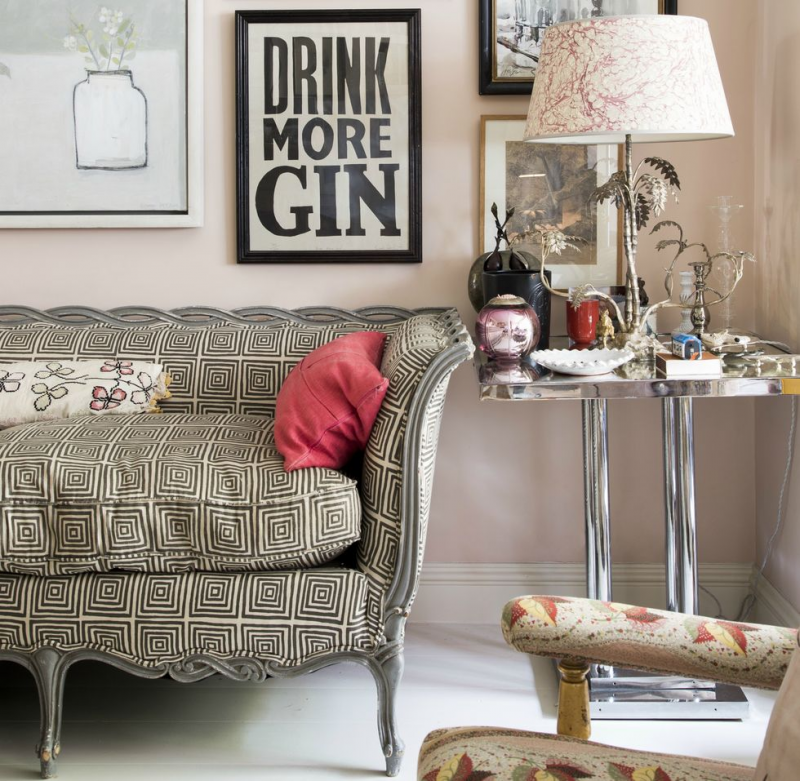
Don’t avoid patterns in small spaces. The right patterns can actually make a small living room look bigger by adding visual interest and depth.
Pattern guidelines for small spaces:
- Use large-scale patterns – Small busy patterns make rooms feel cramped
- Stick to two patterns maximum – Too many patterns create chaos
- Mix patterns in same color family – Maintains cohesion
- Use stripes strategically – Vertical to heighten, horizontal to widen
By strategically choosing the right patterns, you can create an inviting and expansive atmosphere that belies its true dimensions. Remember, the goal is to make every element contribute to an illusion of grandeur and comfort.
Pro Tip: Incorporate reflective surfaces like mirrors or metallic accents to amplify the effect of patterns and textures, further expanding the visual space.
Don’t Miss: How to Style a Curved Sofa for an Inviting Living Room
17. Don’t Forget the Fifth Wall: Your Ceiling

Most people forget about the ceiling, but it’s crucial for making a small living room look bigger. The right ceiling treatment can add significant visual height.
Ceiling enhancement techniques:
- Paint it lighter than walls – Creates the illusion of height
- Add architectural details – Crown molding or ceiling medallions
- Install recessed lighting – Eliminates bulky fixtures
- Use glossy paint – Reflects light and adds depth
For an even more dramatic effect, integrate lighting design with your ceiling enhancements. Uplighting can accentuate architectural details and draw the eye upward, while a well-placed skylight or sun tunnel can flood the room with natural light, making the ceiling feel limitless.
Pro Tip: When selecting paint colors, remember that cooler tones tend to recede, making a space feel larger, while warmer tones advance, making a space feel cozier. For ceilings, opt for a cool, light shade to maximize the sense of openness.
Also: Best Pro Tips to Create a Focal Point in a Room
18. Create a Flow with Consistent Flooring

Consistent flooring throughout connected spaces makes areas feel larger and more cohesive. Different flooring materials create visual breaks that make spaces feel choppy.
Flooring strategies:
- Use same flooring throughout – Creates visual continuity
- Choose light-colored flooring – Reflects more light
- Install planks lengthwise – Makes rooms appear longer
- Keep rugs proportional – Large rugs make spaces feel bigger
When selecting flooring, consider the overall aesthetic and functionality you aim to achieve. Harmonizing your flooring choices not only enhances the visual flow but also impacts the perceived size and comfort of a room.
A thoughtful approach to flooring can significantly elevate the design and feel of your entire home, creating an inviting and unified atmosphere that reflects your personal style.
Pro Tip: To ensure seamless transitions and a truly cohesive look, lay out samples of your chosen flooring materials in different lighting conditions and next to existing furniture or wall colors before making a final decision. This helps visualize the outcome and avoid any surprises.
19. Use Smart Storage Solutions

In addition to utilizing light colors and maximizing floor space, incorporating smart storage solutions is key to making a small living room look bigger. Clutter can make a space feel cramped and overwhelming, so it’s essential to find ways to keep belongings organized and out of sight. Consider furniture pieces with built-in storage, such as ottomans with hidden compartments or coffee tables with shelves underneath.
Invisible storage ideas:
- Built-in window seats – Seating plus storage
- Under-sofa storage – Slide-out drawers or bins
- Wall-mounted cabinets – Storage that doesn’t take floor space
- Decorative baskets – Beautiful and functional
Wall-mounted shelves and floating cabinets can also free up valuable floor space while providing a place to display decorative items or store everyday essentials.
By implementing these smart storage solutions, you can maintain a clean and tidy living room that feels spacious and inviting, even in a limited space. So, when you’re brainstorming how to make your small living room look bigger, don’t overlook the importance of incorporating clever storage solutions to keep clutter at bay.
Pro Tip: Maximize vertical space with wall-mounted shelving or floating shelves to keep frequently used items accessible and organized without sacrificing floor space.
Also: 15 Best Tips To Decorate A Living Room: From Start to Finish
Here’s a recap of the best tricks to make a small living room look bigger:
- Opt for pale or light-colored paint for both walls and ceilings to create a sense of openness.
- Choose reflective finishes for walls and floors, but use them in moderation to avoid overwhelming the space.
- Hang mirrors strategically to bounce light and create the illusion of depth.
- Keep surfaces clear by decluttering and investing in smart storage solutions.
- Select furniture with small or low proportions, or opt for visually lightweight pieces like those made of clear glass.
- Display one large piece of art as a focal point instead of cluttering the walls with multiple smaller pieces.
- Keep windows clutter-free and use curtains or blinds that can be pulled back or up to maximize natural light.
Also: Where to Place Your Sofa for Best Functionality In Your Living Room
How Did I Choose These Space-Enhancing Techniques?
As an interior designer with over a decade of experience in small space living, I’ve personally tested these techniques in my own 650-square-foot apartment. After struggling with cramped quarters for years, I became obsessed with finding solutions that actually work.
These 19 techniques aren’t just theoretical—they’re battle-tested strategies I’ve used to transform multiple small living spaces. I’ve also interviewed dozens of professional interior designers and analyzed the latest research on spatial psychology to ensure these methods are backed by both science and real-world results.
Every recommendation in this guide has been verified through multiple sources, including leading interior design publications like Architectural Digest, Better Homes & Gardens, and insights from top designers currently working in the field.
Most Popular Post:
Interior Design Style Quiz
Timeless Paint Colors That Never Go Out of Style
Create Your Perfect Ergonomic Home Office: A Complete Guide
Must-Have Accessories for Guys: The Secret to a Stylish Space
Modular Sofas for Small Spaces: Brilliant Solutions for Compact Living
Conclusion
Now you know exactly how to make a small living room look bigger using 19 proven techniques. The best part? You don’t need to implement all of them at once.
Start with the three most impactful changes:
- Paint your walls a light color – Instant visual expansion
- Add a large mirror opposite your main window – Doubles available light
- Declutter and organize – Removes visual chaos
These three changes alone will make your living room feel significantly more spacious. Once you see the results, you’ll be motivated to implement the remaining techniques.
Remember, making a small living room look bigger isn’t about expensive renovations or designer furniture. It’s about understanding how our eyes perceive space and using that knowledge to create the illusion of openness and airiness.
Your cramped living room has hidden potential. With these proven techniques, you can unlock it and create a space that feels twice its actual size. The spacious, airy living room you’ve always wanted
FAQs: How to Make a Small Living Room Look Bigger
Q: Can I use dark colors in a small living room, or will they make it feel even smaller?
A: While dark colors can add drama and coziness to a space, they can also make it feel more closed-in. Opting for lighter hues will help create the illusion of more space and brightness.
Q: How can I make my small living room feel less cluttered?
A: Decluttering is key to making a small living room feel more spacious. Invest in smart storage solutions like hidden compartments in furniture, wall-mounted shelves, and baskets to keep items organized and out of sight.
Q: Will hanging mirrors really make a difference in making my small living room look bigger?
A: Yes, hanging mirrors strategically can help bounce light around the room, creating the illusion of depth and making the space feel larger. Place mirrors opposite windows or in areas where they can reflect natural light for the best effect.
Q: I have a lot of furniture I love, but it’s making my small living room feel cramped. What can I do?
A: Consider downsizing your furniture or selecting pieces with smaller proportions. Opt for multifunctional furniture that serves multiple purposes to maximize space without sacrificing style.
Q: How can I make my small living room feel cozy without sacrificing space?
A: Incorporate soft textiles like throw pillows, rugs, and curtains to add warmth and coziness to the room. Stick to a cohesive color scheme and avoid overcrowding the space with too many accessories.
Subscribe To the Newsletter!
Subscribe now for an endless feed of inspirational women’s cave decor ideas, pampering rituals, and more tips for curating your ultimate escape. Let’s start making your cozy refuge a reality – you so deserve this!
CATCH THE LATEST IN HOME DECOR TRENDS:
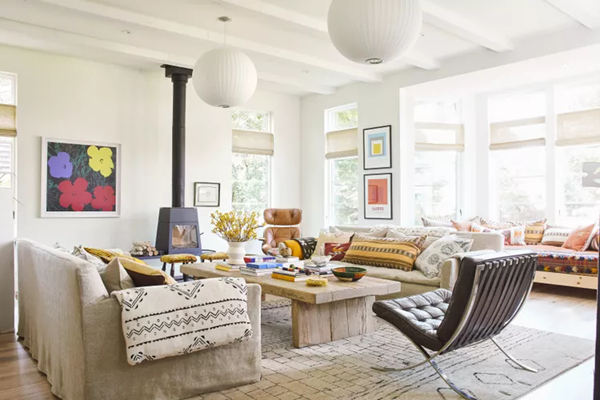
Steal These 16 Expert-Approved Decorating Secrets

How To Accessorize Your Living Room
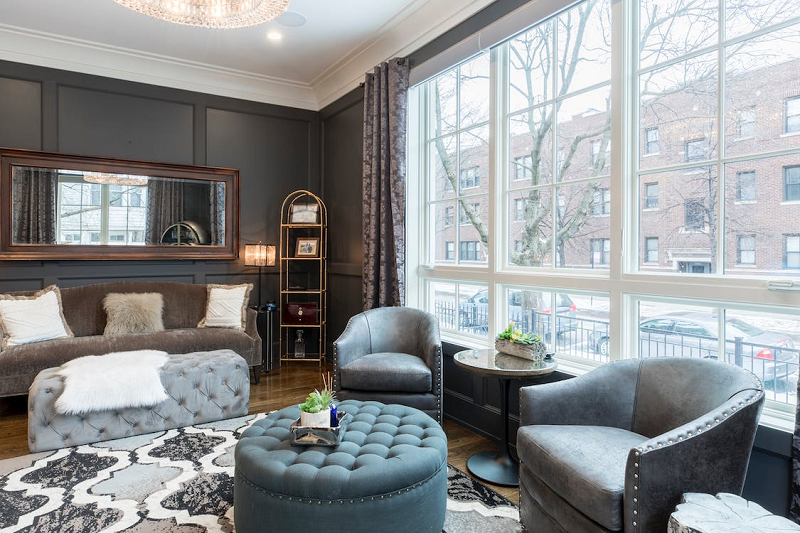
Small Space? 10 Ways To Make A Room Appear Bigger
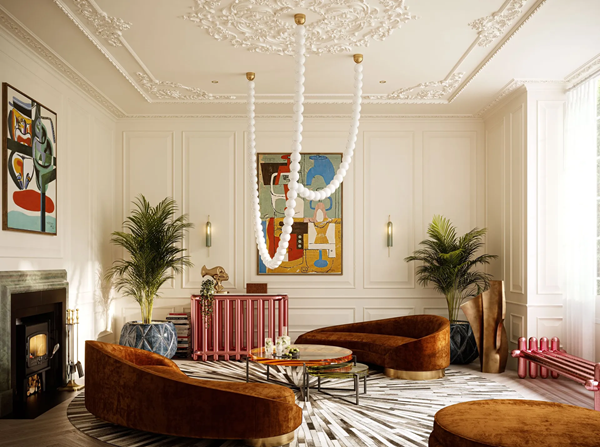
Make Your space Look Expensive
GET CAUGHT UP ON ALL THE INSPIRING DECOR TIPS:
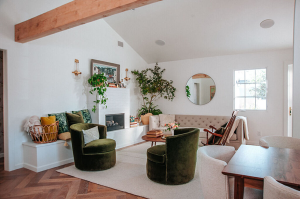
18 Fresh Decorating Ideas To Update Your Fireplace
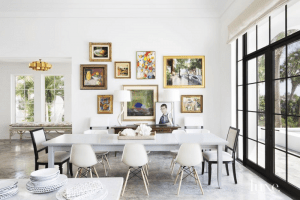
How to Make a Gallery Wall: The Complete Step-by-Step Guide (Even If You’ve Never Hung a Picture)


